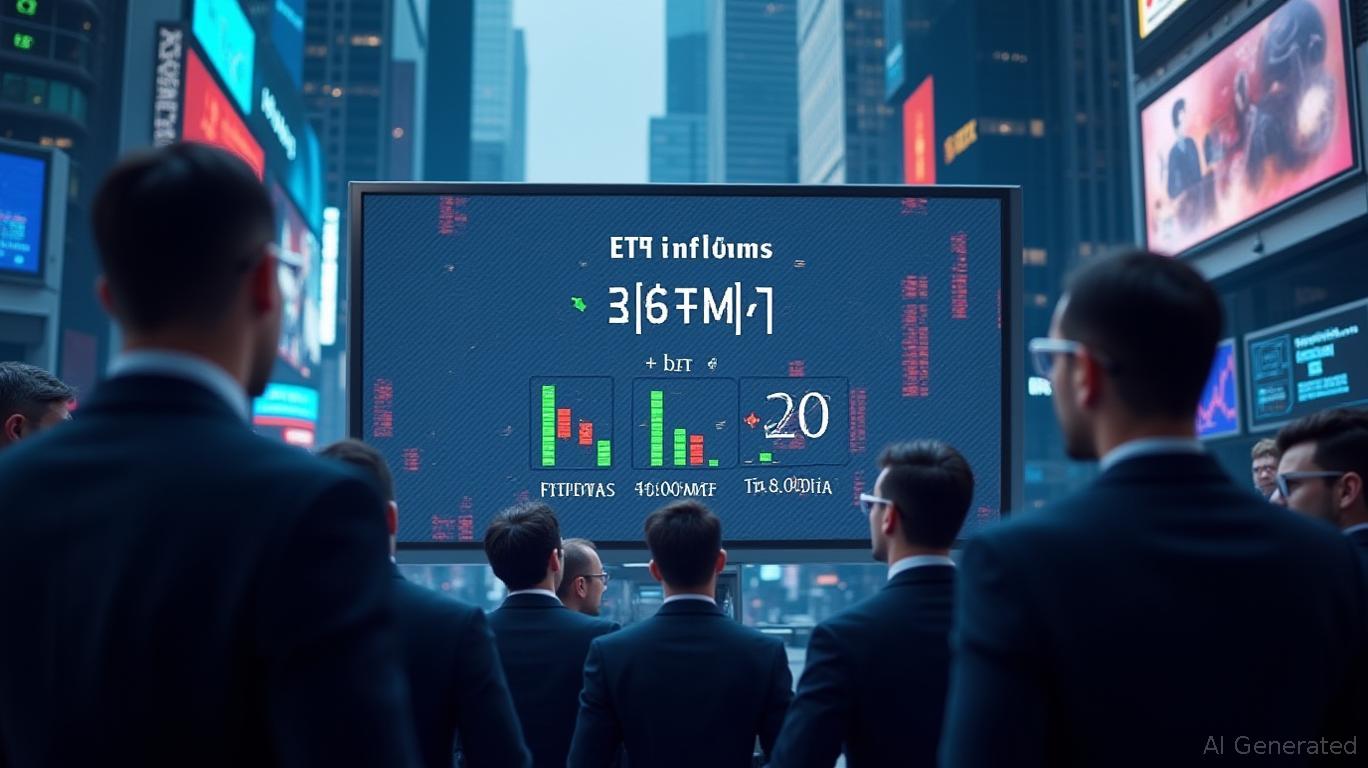Mamdani's Initiatives Put New York City at Odds With Wall Street and Cryptocurrency Companies
- Zohran Mamdani's progressive policies as NYC's first Muslim mayor could reshape finance and crypto sectors, sparking debates on affordability and regulation. - Proposed 2% income tax on $1M+ earners and 11.5% corporate tax aim to fund housing and childcare, but may drive crypto firms to low-tax states like Texas. - Cuomo and Trump opposed Mamdani's agenda, while analysts debate his limited powers under state budget rules and potential regulatory pressures on crypto. - NYC's existing crypto regulations an
Zohran Mamdani’s win in the New York City mayoral race has sparked significant discussion across both the financial and cryptocurrency sectors, as experts consider how his progressive agenda could transform the city’s economy. At 34, Mamdani, a democratic socialist and soon-to-be the city’s first Muslim mayor, ran on promises of making the city more affordable, advancing social justice, and holding corporations accountable—policies that have unsettled Wall Street and crypto leaders but galvanized left-leaning voters. His projected victory, according to
Mamdani’s policy proposals feature a 2% tax on individuals earning above $1 million, an 11.5% peak corporate tax rate, and a rent freeze on stabilized apartments, all designed to raise $10 billion each year for affordable housing and universal childcare, as outlined by

The incoming mayor’s position on cryptocurrency remains unclear. Unlike his predecessor Eric Adams, who created an Office of Digital Assets and Blockchain Technologies, or his main opponent Andrew Cuomo, who suggested appointing a chief innovation officer to champion Web3, Mamdani has made only limited statements about the sector, according to
Cuomo, who ran as an independent after failing to secure the Democratic nomination, positioned himself as a crypto-friendly candidate, promoting blockchain as a driver of economic growth, according to The Block. His campaign drew backing from financial and crypto heavyweights, including hedge fund manager Bill Ackman, who contributed $1.25 million to anti-Mamdani PACs, as reported by
Experts remain split on what Mamdani’s leadership will mean. JPMorgan and GW&K Investment Management argue that the mayor’s authority is limited by New York’s balanced-budget laws and state-level controls, which should prevent sudden policy changes, Forklog reported. The Financial Emergency Act restricts unilateral spending, and significant tax reforms would need approval from both the city council and the state. Still, critics such as David Sacks, the White House’s crypto and AI advisor, have claimed that Mamdani’s agenda signals a “communist” shift for the Democrats, urging Silicon Valley to support Trump or risk increased regulation, as noted by TradingView.
New York’s crypto sector is already navigating complex regulations. The NYDFS recently broadened blockchain analytics requirements for banks dealing with digital currencies, and the city is considering new taxes on crypto transactions, Forklog reported. Mamdani’s administration may intensify regulatory scrutiny but could also back Web3 projects that deliver clear social value, such as blockchain-powered subsidy programs.
For now, Mamdani’s main priority is affordability, and the future of crypto in New York will depend on how he balances progressive ideals with economic realities. With Governor Kathy Hochul supporting Mamdani and emphasizing the importance of countering “President Trump’s agenda,” the city’s financial and political communities are preparing for a period of negotiation and unpredictability, according to Forklog.
Disclaimer: The content of this article solely reflects the author's opinion and does not represent the platform in any capacity. This article is not intended to serve as a reference for making investment decisions.
You may also like
Solana News Update: Institutions Favor Solana's Fast Transactions, Driving $417 Million ETF Inflows and Surpassing BTC and ETH
- Solana's blockchain hit $29B weekly DEX volume and 70M daily transactions in October, surpassing Ethereum . - Bitwise Solana ETF attracted $417M inflows, outpacing Bitcoin/ETH ETFs amid growing institutional adoption. - Network's 1,100 TPS throughput and 7% staking yields contrast with Ethereum's 3% yields and fragmented Layer 2 solutions. - Whale activity and $2T stablecoin transfers highlight ecosystem strength, while XRP's 25,000 daily accounts lag behind.

Supreme Court Set to Decide on Trump Tariffs Amid Dispute Over Presidential Authority
- U.S. Supreme Court will rule on Trump's global tariffs, testing presidential emergency powers under IEEPA. - Lower courts declared tariffs illegal, but Trump frames them as vital for national survival and economic growth. - Critics warn expanded executive authority risks congressional oversight, while small businesses face existential costs from 10%+ duties. - Ruling could invalidate $10B+ in revenue or enable future administrations to bypass legislative constraints through emergency declarations. - Case

Supreme Court Ruling May Reshape Balance Between Executive and Congressional Authority on Trade
- U.S. Supreme Court will decide if Trump's global tariffs under IEEPA exceed presidential authority, reshaping executive-congressional trade power balance. - Legal challenge argues IEEPA's emergency powers don't authorize tariffs, citing Congress' constitutional commerce regulation role and "major questions doctrine" violations. - Ruling could invalidate $100B+ in tariffs, destabilize fiscal strategy, and set precedent limiting or expanding future presidential trade power unilaterally. - Economic risks in

Bitcoin Updates: Institutions Wager on Bitcoin Pullback While Market Awaits Broader Economic Triggers
- Matrixport highlights Bitcoin's near-oversold levels as potential "buying the dip" opportunities amid declining on-chain activity and shifting market structure. - Institutional confidence grows as entities like The Smarter Web Company and Hyperscale Data accumulate BTC during price dips, signaling long-term strategic positioning. - Analysts warn sustained recovery depends on macro catalysts like regulation or economic shifts, despite technical indicators showing early stabilization and $100k support. - M
